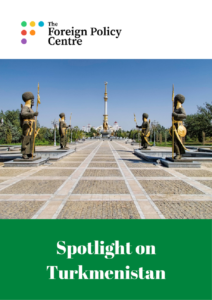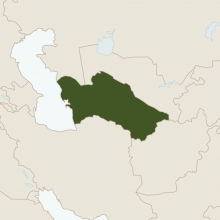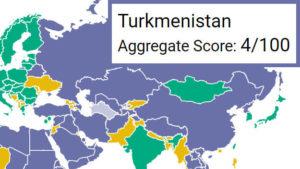 Investors and governments should stop cozying up to gas-rich Turkmenistan, according to a new analysis that describes the central Asian hermit state as “a country teetering on the edge of catastrophe”, The Guardian reports:
Investors and governments should stop cozying up to gas-rich Turkmenistan, according to a new analysis that describes the central Asian hermit state as “a country teetering on the edge of catastrophe”, The Guardian reports:
Turkmenistan, second only to North Korea in the scale of its isolation and leadership cult, has long been courted by western governments eager to tap into its gas reserves and associated wealth. The country is thought to possess about 10% of the proven global reserves of natural gas, but is currently in the midst of an economic crisis.
“Hunger and hyperinflation are being managed by further increasing the scale of human rights abuse and the level of intrusion into people’s lives,” says the report by the London-based Foreign Policy Centre.
FPC director Adam Hug said Turkmenistan was the worst country in the region “in terms of the depth and breadth of repression”, and said foreign investors should think twice before associating themselves with the country.

NDI
Turkmenistan is a country often overlooked on the world stage. When attention is paid the focus tends to be either on the size of its bountiful gas reserves or on the eccentricities of its leadership, notes the FPC’s Hug. The research shines a spotlight on a country in the middle of a sustained economic crisis that has seen hyperinflation in the lives of ordinary people and widespread food shortages. This economic crisis has in turn led to the regime’s repression becoming ever tighter and its personality cult becoming ever more grandiose, he writes in a new report:
While investors may be initially attracted to Turkmenistan due to its enormous gas wealth it has huge structural challenges. It is a ‘Potemkin economy’, with marble facades, respectable official gross domestic product (GDP) figures and tightly regulated state shops, which mask a huge and chaotic black economy. Potential investor risks include: the whims of the President, leading to arbitrary behaviour by a sclerotic bureaucracy; a high risk of non-payment for goods or services; endemic corruption; insecurity of legal title or contracts; the lack of rule of law and independent judiciary; and reputational risks from being associated with severe human rights abuses.

Freedom House
Human rights groups recently published an open letter to the European Bank for Reconstruction and Development, suggesting that it should not expand its public sector lending programs in Turkmenistan until the regime demonstrates “concrete and measurable progress” in its stated commitment to human rights and democracy “resulting in real life improvements for the citizens of Turkmenistan.” They called on the EBRD to use human rights benchmarks recently adopted by the European Parliament to measure progress in this area and to determine the Bank’s level of engagement in the country.
Legal changes allowing a supposed “multiparty” system suggest that Turkmenistan is seeking to elevate itself in the eyes of the international community, from what Freedom House has called “the worst of the worst” to the level of a “normal” authoritarian regime, analyst Sergey Radchenko wrote for the National Endowment for Democracy’s Journal of Democracy.
 The FPC report documents the vast range of Turkmenistan’s human rights abuses but draws particular focus to the issues of forced labour, ‘disappeared’ activists in the prison system and restrictions on independent journalists and human rights activists, Hug adds, highlighting the challenges facing Turkmenistan’s civil society.
The FPC report documents the vast range of Turkmenistan’s human rights abuses but draws particular focus to the issues of forced labour, ‘disappeared’ activists in the prison system and restrictions on independent journalists and human rights activists, Hug adds, highlighting the challenges facing Turkmenistan’s civil society.
As Turkmenistan transitioned directly from Soviet to local authoritarians so there was limited space for independent civil society to gain a foothold in the 1990s and the subsequent regime consolidation has limited the space for government critical civil society action to a few very brave activists. For example, with the Government conducting mass extermination of stray dogs and cats, notably around the Asian Indoor Games in 2017, animal rights activist Galina Kucherenko was arrested and detained for her activism. Similarly one of the few independent civil society activists who works openly in Turkmenistan Natalya Shabunts, also faced harassment for her work in attempting to stem the dog cull, having previously been under house arrest and constant surveillance for her activities.
This is not to say there are no civil society organisations at all, he notes. Large centrally organised groups such as the Magtymguly Youth Organisation, the Women’s Union of Turkmenistan and the National Centre of Trade Unions of Turkmenistan remain major organising blocks in the civic space and partners for international donors. They also provide the frameworks for the ‘alternative’ political parties recently elected to the Mejlis.
The report also contains contributions from experts Including: Bruce Pannier (Radio Free Europe/Radio Liberty); Eimear O’Casey (Control Risks); and Dr Luca Anceschi (University of Glasgow). RTWT







